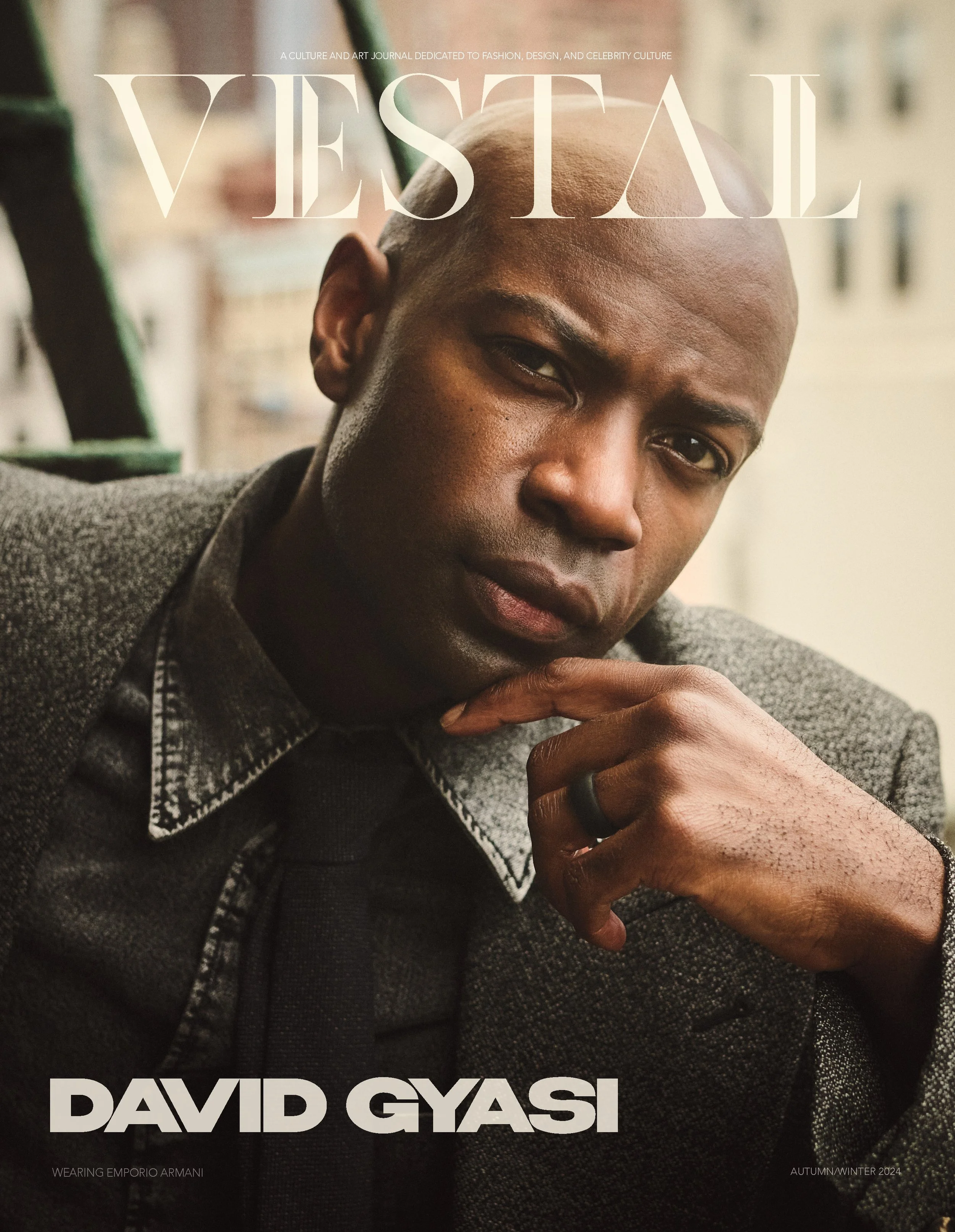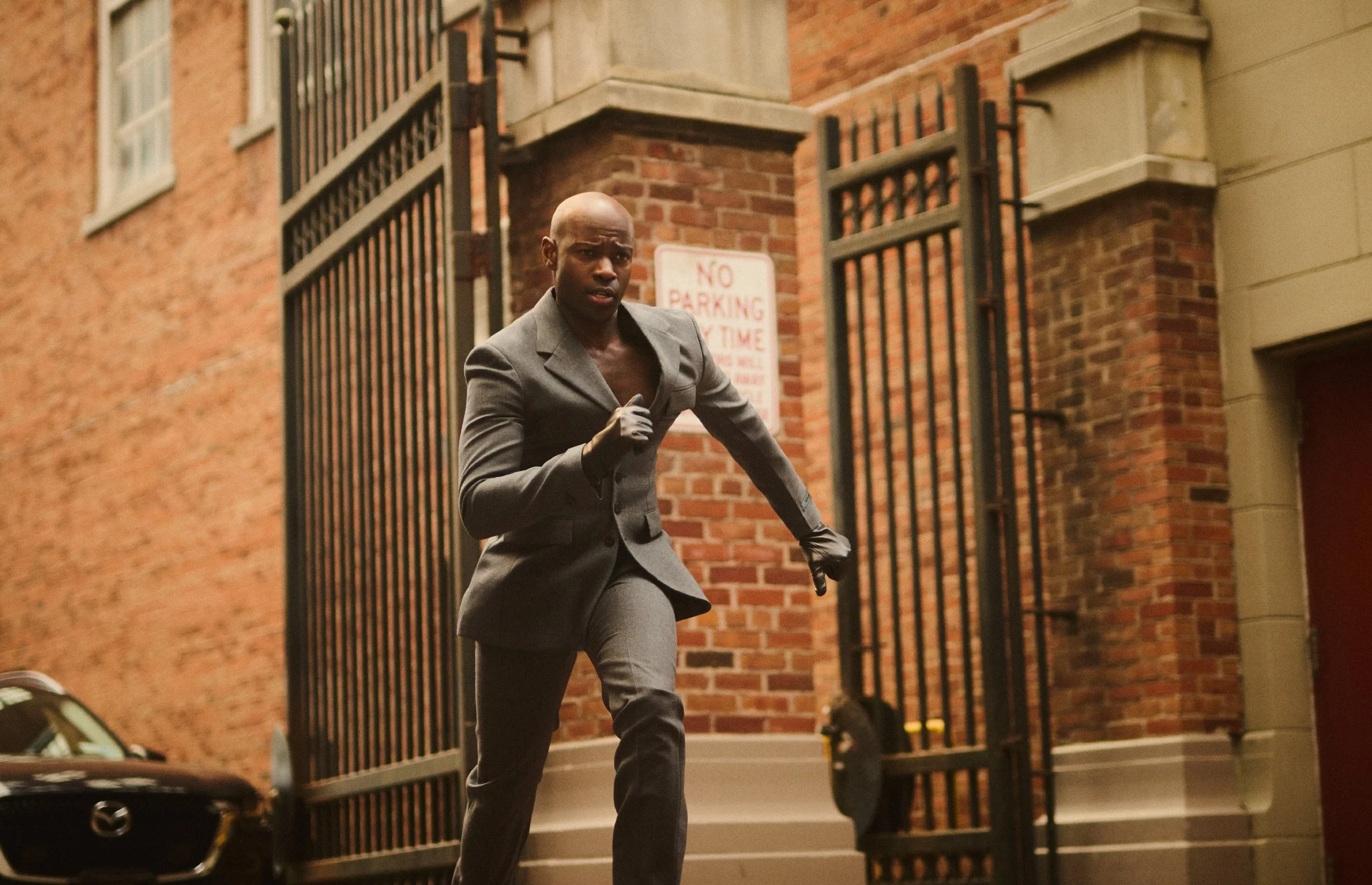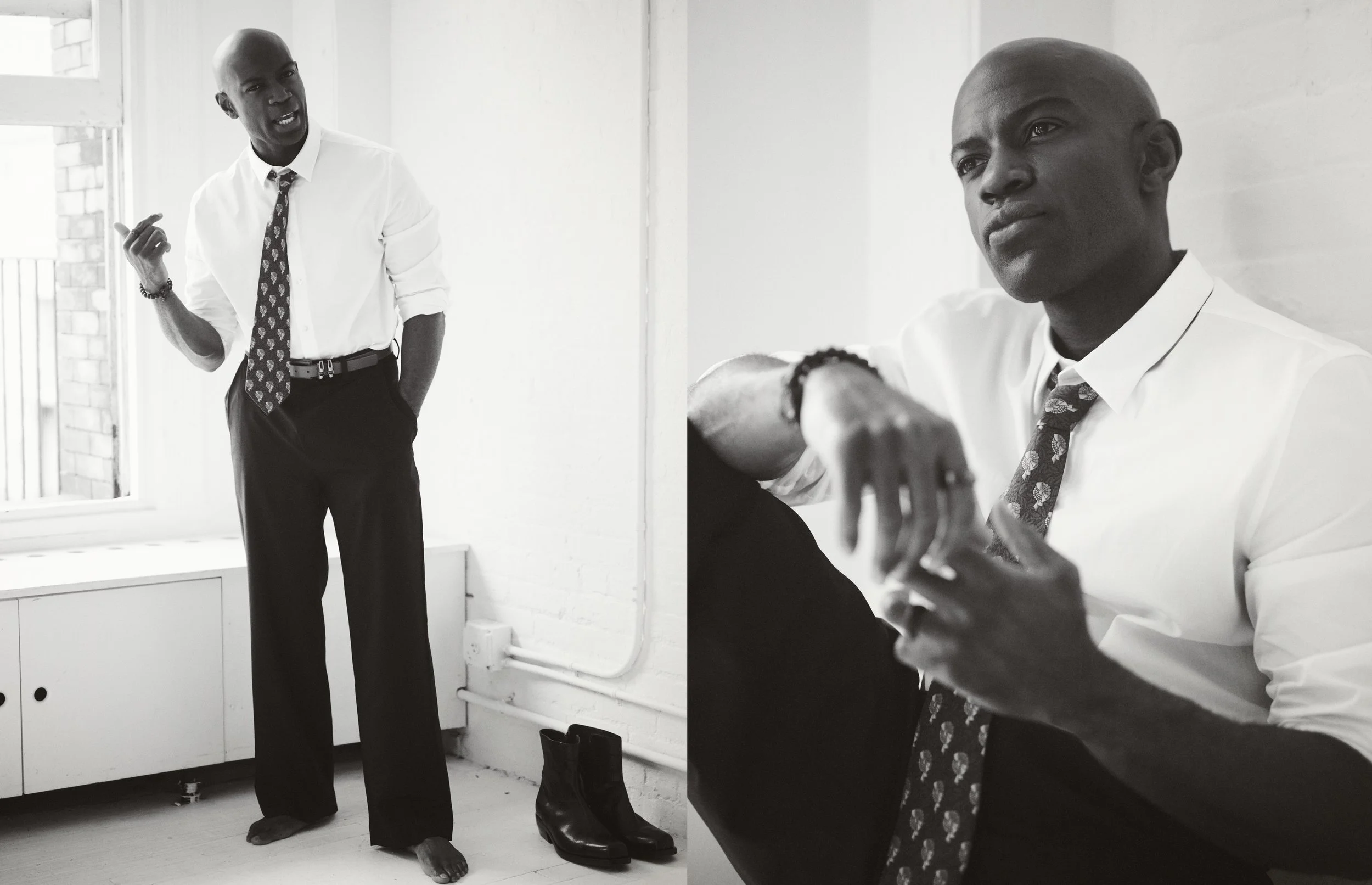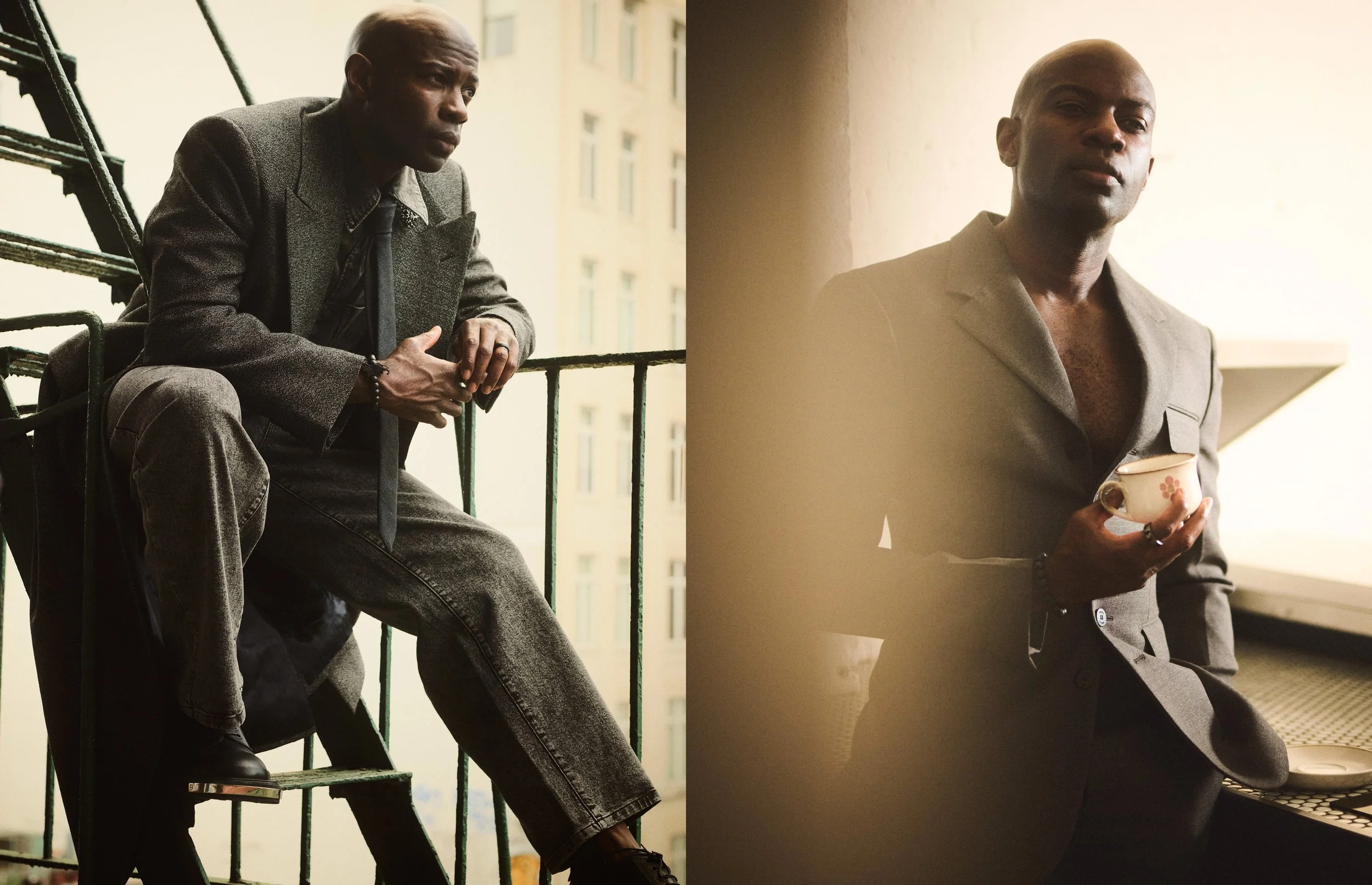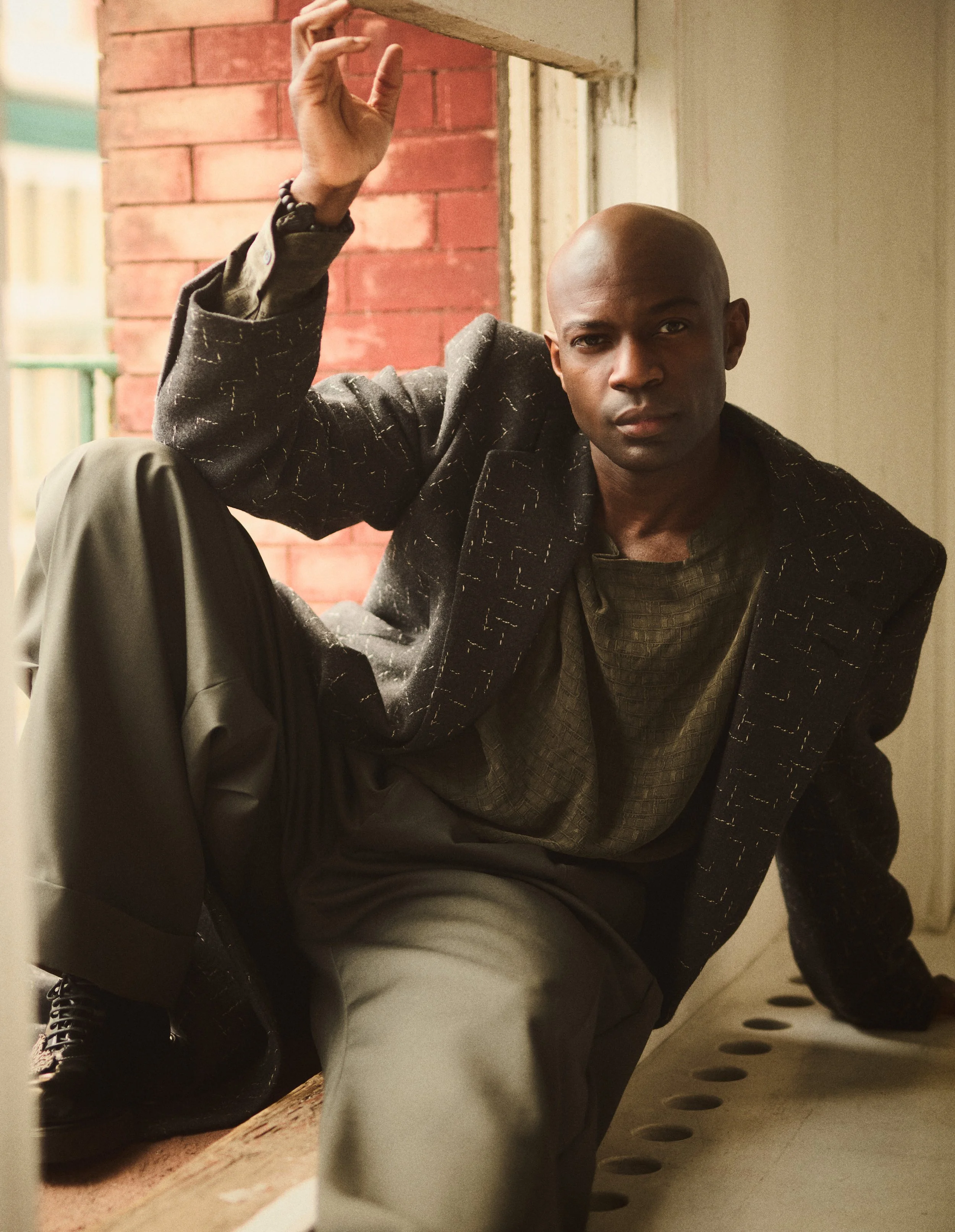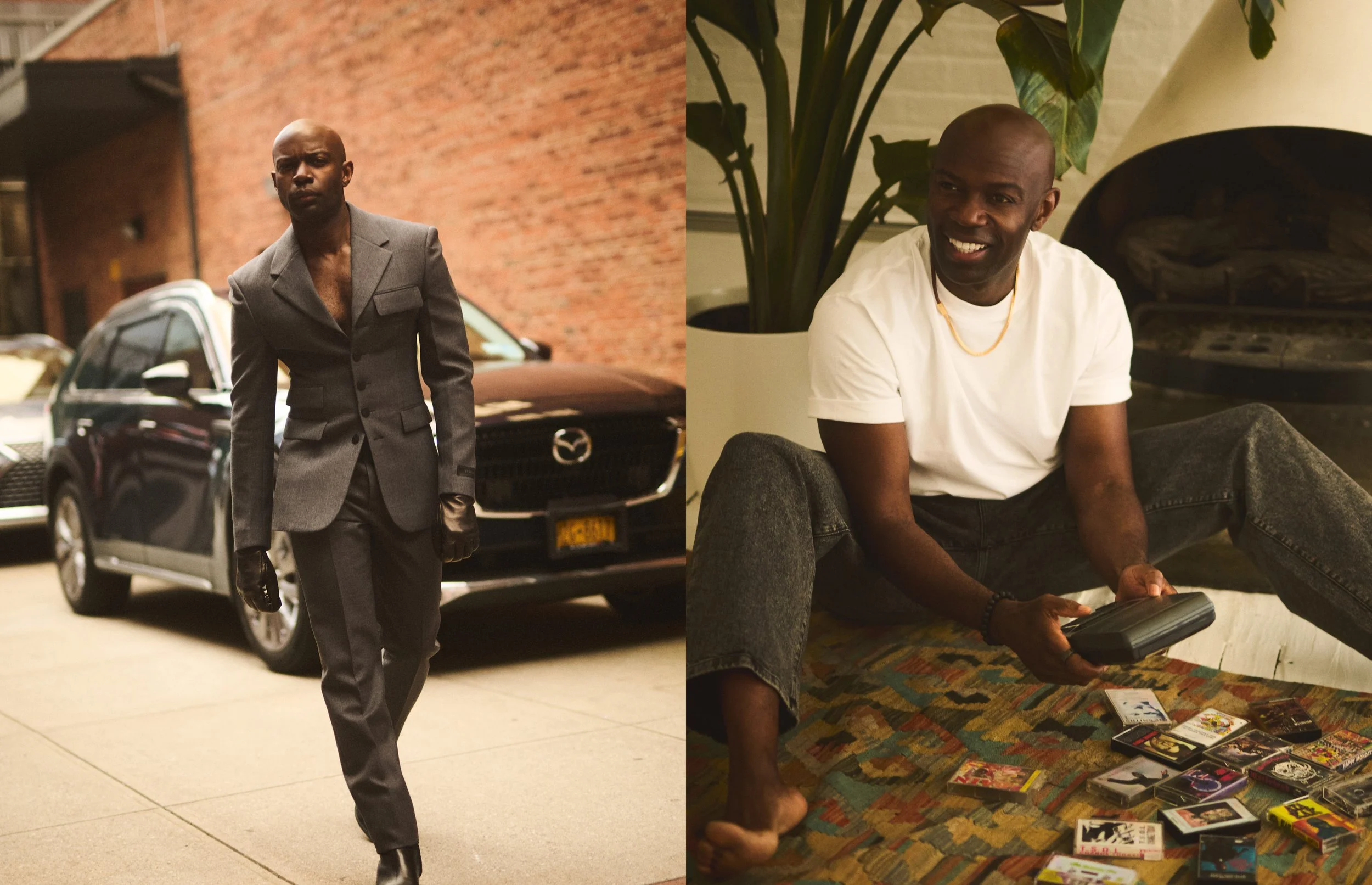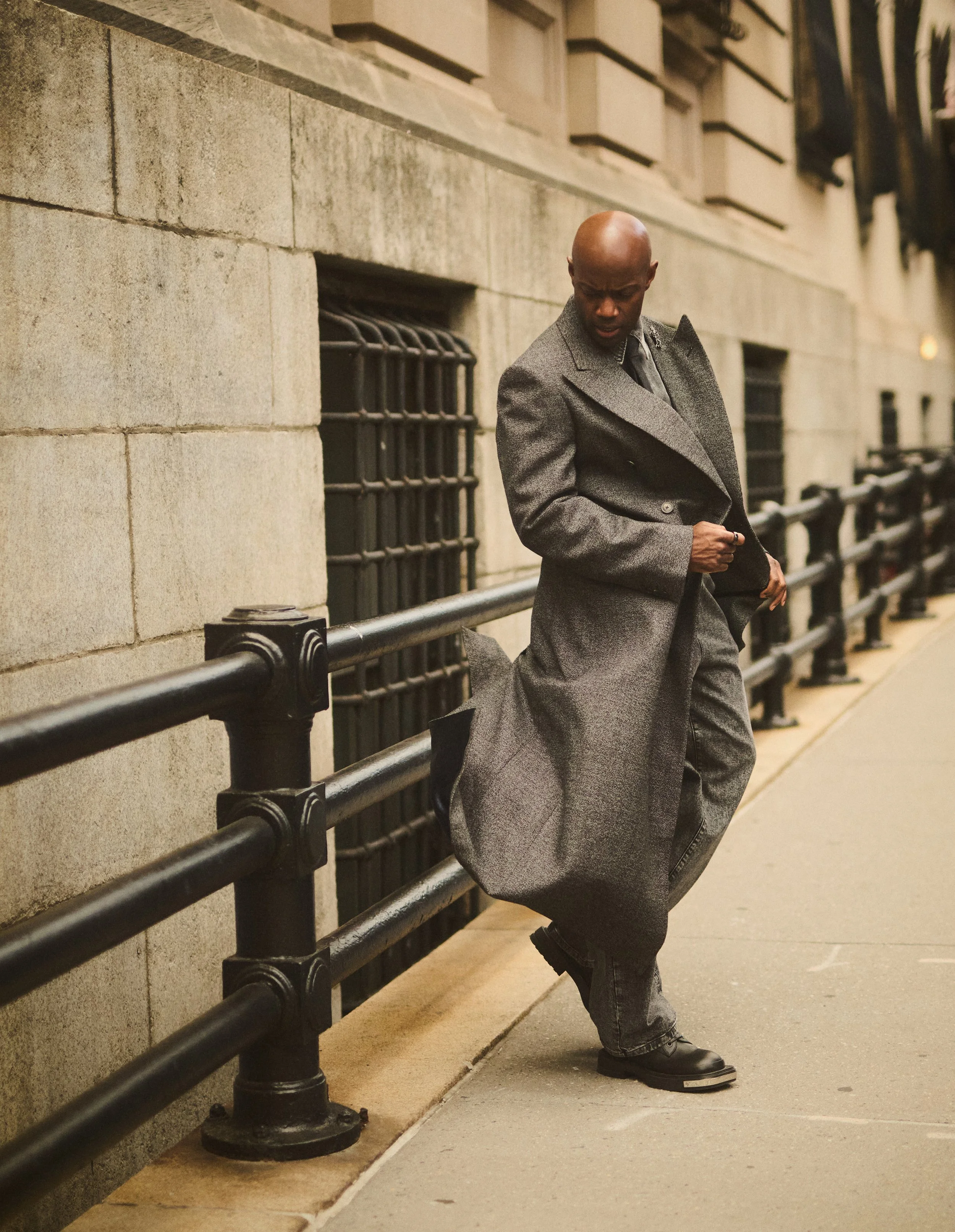N ° 11 ANNUAL COLLECTOR’S PRINT EDITION 2025
Total look EMPORIO ARMANI
“ As the industry begins to open up and recognize the benefits of exploring diverse narratives, I’ve started seeking out the more interesting untold stories.”
— DAVID GYASI
Total look VERSACE.
Photography Kevin Sinclair Styling Odile Iturraspe Garland
Interview Carl Ayers
In season two of The Diplomat, David Gyasi reprises his role as Austin Dennison, the British foreign secretary caught in a web of political intrigue and personal conflict. After navigating the chaos and betrayal of season one, Dennison now grapples with an escalating sense of isolation and distrust.
David offers profound insights into Dennison's evolving arc, where the weight of duty clashes with his instinct to protect his personal vulnerabilities. The British actor reflects on how the character’s journey resonates with his own experiences as a Black actor in predominantly white spaces. Each role David has embraced—from Achilles in Troy: Fall of a City to Agreus Astrayon in Carnival Row—showcases his deep understanding of identity and resilience in the face of adversity. His journey is not just personal; it serves as a powerful commentary on the necessity of impactful Black male roles that challenge stereotypes and inspire change. In The Diplomat, David’s portrayal reveals the intricate balance between public service and personal integrity, a theme that resonates deeply with his own life lessons and respect for the trailblazers who have paved the way for future generations. Through the lens of Dennison, David delves into the complexities of leadership, sacrifice, and the often-unspoken tensions that arise behind closed doors.
Shirt and pants DOLCE & GABBANA, tie CELINE, belt ARMANI, shoes VERSACE.
TENSION LINES
Carl Ayers __ You play Austin Dennison, the British foreign secretary, in Netflix’s political drama The Diplomat. With season two being highly anticipated, what can you tell us about Austin Dennison’s journey in this new season?
David Gyasi __ I almost feel like Dennison has become more insular. After the chaos of season one—where everything, not just the car, blew up—he’s left unsure of who to trust, whether it’s people close to him or international allies. This uncertainty makes Dennison turn inward, relying on what he knows and trusts: his own instincts. This complicates his relationship with Kate Weiler, but for Dennison, he’s been in this position before, used to being an audience of one—a lone voice in many situations. That’s where we find him—more guarded and focused on self-reliance.
CA __ When you got the scripts for season two, were there any surprises for you in portraying his role? Anything challenging or unexpected?
DG __ Oh, definitely. There’s a lot that’s surprising, and when you watch it, you’ll see what I mean. One of the things I love about Deborah [Cahn] and the writing team is how they push the boundaries of the story. Season one was intriguing and well-received, but it barely scratches the surface. In season two, we dive deeper into a complex web of events leading up to the car explosion. I remember reading the first episode of season two and realizing I hadn’t breathed for the first 15 pages. The tension is intense—you’re immediately thrown into uncertainty: who’s been attacked, what’s happening, should we lock down London? It grips you from the start, then gradually begins to unfold. The most surprising part for me was how much more insular Dennison becomes in season two, trusting only himself. A rift unexpectedly grows between him and Kate, despite them becoming close in season one—possibly even more than friends. What’s interesting is that even though they don't openly deal with this connection they’ve built, it’s still there, just sitting beneath the surface, festering. They try to stay professional, but there’s this energy between them that neither of them acknowledges directly. And you get the sense that while they’re blind to it, people around them can see it. I found that dynamic really intriguing. I also felt a bit sad for Dennison because of how much he’s focusing on his career and ambition. He’s neglecting deeper, more personal aspects of himself—his spirit, his heart. There’s this internal scream inside him throughout season two, and it’s like he’s constantly asking, "Where can I be myself? Where can I truly be honest?" It was interesting to portray the exploration of that tension.
Total look EMPORIO ARMANI. ( opposite ) Total look VERSACE.
CA __ I love how you describe Dennison. How does his interaction with Kate evolve in season two? In season one, they seemed to be moving in a different direction, but now he has to put that aside to focus on his job. He often grapples with the balance between personal loyalty and political obligations. As an actor, how do you navigate that balance? Sometimes, you want to fully embrace one direction, but the dynamics pull you in another. How do you balance that portrayal?
DG __ One thing I did was speak to our current foreign secretary when he was the shadow foreign secretary. Interestingly, he shares the same skin tone as me. When I first auditioned for this role, that wasn’t the case; we had never had a foreign secretary who wasn’t white. Since then, we’ve seen a number of diverse leaders. From my conversations with him, I realized how much effort goes into being a pioneer and leader, especially for people of color. He advised me to be aware of the implications if Dennison crosses a line with Kate Weiler in their relationship. For example, former President Trump has said and done many things that, if applied to President Obama, would have prevented him from becoming president. I approached this role wanting to honor these pioneers and the challenges they’ve navigated. I want our storyline to reflect that. In this new season, we will explore the tension between personal relationships versus political obligations. Dennison ultimately returns to what he knows: his duty to serve his country and prioritize its needs. I don’t think he’ll ever stray from that path. The more isolated he becomes, the more he may need to reach out. It’s like starting to sink underwater—you need to come up for air. Sometimes that air comes from human connection, and other times it’s about nurturing your spirit, rather than focusing on the demands of your career.
CA __ That’s so well said. Finding that balance between personal and professional—knowing when to lead with your head versus your heart—is something we all struggle with as humans. For actors, portraying a character while wanting to lead with your heart can be challenging, especially when the script dictates otherwise. With that in mind, do you have any input on the direction of your character? Can you influence how your character speaks or is portrayed in the series?
Total look EMPORIO ARMANI.
DG __ Great question! The show is so well-written that I don't feel the need to get too involved in the script. However, I do have honest and deep conversations with Deborah [Cahn], our showrunner. I know she listens to my thoughts, just as I listen to hers. We allow those discussions to percolate, and I believe that seeds of our conversations emerge in both the writing and my performance. There are times when a conversation we have may not result in a specific line, but it can manifest in more nuanced ways. For example, when Dennison walks up the stairs of 10 Downing Street to meet Trowbridge, he passes by portraits of all the former prime ministers and foreign secretaries—none of whom look like him. That moment carries significant weight. In season one, we first meet Dennison in front of a mural designed to represent the world, which is also a purposeful choice. I think there's a lot of trust and openness between us, which enriches the storytelling.
CA __ What do you think will surprise viewers the most about season two?
Total look EMPORIO ARMANI.
DG __ Honestly, I believe it’s the storyline itself. The main arc is significant, and I’ve been listening to people as I walk my dog or have a drink with my wife at the pub. They’re always eager to share their predictions about what will happen—whether it’s with Dennison’s relationships or his career. I think viewers will be surprised by how things unfold. The writers may not completely abandon some of these anticipated plot points, but they enjoy prolonging the tension and tweaking the dynamics to keep things interesting. So, I think the major storyline and the intricacies of the relationships will truly surprise them.
CA __ What do you envision for Austin Dennison’s future? Where do you see his character going?
DG __ We just started filming season three, and we’re only allowed to focus on what we’re currently working on since the writers are still tweaking and adjusting the storylines to get the best possible outcomes. What I hope to see is a glimpse of that internal struggle we’ve talked about. I’d love for us to explore how that inner conflict impacts Dennison’s personal relationships, especially with Kate Wyler, as well as his ambition and his interactions with the Prime Minister and his country, including allied nations. It will be fascinating to see how that internal conflict plays out, but we must also remember that he’s a professional and a Black academic. There’s a tremendous amount of effort and weight behind that, and it will always influence any scene he’s in and every performance he delivers. I’m excited about balancing those elements as I step into the role and express Austin Dennison’s journey.
CA __ I have to say that they definitely selected the right person for this role. Having a strong Black lead has been a significant part of the conversation in recent years, especially during the global pandemic. The world has been focusing on increasing diversity and amplifying voices that are often diminished. Your portrayal brings a strength that’s truly needed and hard to find across the board. I’d like to pivot a bit and talk about the rest of your career. You’ve had a diverse journey across film, TV, and stage. How do you go about choosing your roles, and what do you look for in a character?
DG __ That’s always a bit difficult to answer, but let me walk you through my process. When I get an email saying, “David, would you be interested in this?” I read the material, then I take a moment to breathe and step away. I reflect on what those words evoke within me—what’s going on in my head and how my artistic soul connects to it If the story has elements that feel untold or showcases a leveling up in representation, then that resonates with me. As a young boy, I watched a lot of TV and film before I knew I wanted to be an actor. But growing up, I didn’t often see myself reflected on screen. We only had one television at home, and when there was a Black person on screen, we would all rush to see it. I remember being captivated by performers like Sidney Poitier in In the Heat of the Night or Denzel Washington or Eamonn Walker, who was doing great work in the UK before moving to the States. These figures imprinted on me a desire to aspire to something similar. When choosing roles, I look for elements of dignity, strength, power, and intelligence—qualities I admired in those men and the men around me: brothers, uncles, fathers, and cousins. As the industry begins to open up and recognize the benefits of exploring diverse narratives, I’ve started seeking out the more interesting untold stories. When I read a script, all these thoughts and feelings come to mind. I walk away to let them settle. For example, a few years back, I was offered two roles simultaneously. One was the obvious choice—an award-winning drama series where I would play the new love interest for the lead actress. The other option didn’t have the same accolades, but it captivated my thoughts day and night. Ultimately, I chose the latter. There was another time when I had three opportunities in front of me. My team in the States pushed for the higher-paying project, but I chose the one filmed in London. It was a lead role, and my daughter was taking her exams, so it made sense for me to be home during that time. Different factors influence each decision, but I always strive to align my choices with my values and passions.
Total look VERSACE. ( opposite) Shirt BOSS, jeans EMPORIO ARMANI, necklace VERSACE. (next two images) Total look EMPORIO ARMANI.
CA __ When discussing roles and your career, there’s a distinction between learning through experience and learning through teaching. You've absorbed a lot from the Black men on screen before you and from those in your life. However, you also have formal training—specifically, you studied at Middlesex University, correct?
DG __ Yes, that's right! I loved my time at Middlesex University. It was difficult to get into drama schools as funding was a challenge, but Middlesex offered a degree in acting with access to a student loan with a lower interest rate. This allowed me to pursue my passion for acting. Being in an academic environment was eye-opening. We studied various practitioners and techniques, which helped me find what was useful and relevant to my craft. I was able to build my technique to prepare for performances. What's fascinating about training in this country is that I'm still figuring out how to best apply what I've learned to portray my characters effectively. For example, Meisner's technique emphasizes being present and aware of your scene partner. While it's a valuable concept, the reality is that, as a Black person, there are moments where simply allowing yourself to be present can feel incredibly exposing and, at times, potentially damaging or even scary. This brings me to think of the courage it takes to step into environments where you are one of one and often with some sort of guard—whether that's a specific posture, rolled shoulders, or consciously putting our shoulders back and chest out. I've always wondered if anyone in our training accounts for that moment—the element of armor that we put up. There's also something incredibly powerful and freeing about stepping onto a stage and becoming who we want to be. I remember, as a kid, seeing actors who played leads, being the smartest in the room, and thinking, "That's amazing." As actors, we must explore what it means to be present and engaged with our environment. If art mimics life, the life-mimicking art part might inspire the next generation to stand confidently in their spaces and embrace the elements around them.
CA __ I appreciate your thoughts because, as you speak, I can see connections between your experiences and your role as Austin Dennison. You mentioned being insular, protected, and guarded, and how you can feel safe in one environment but have to navigate another. This duality of separating work from personal life while maintaining the mindset to function and survive resonates deeply with your portrayal of Austin Dennison. I see that thread connecting everything.
DG __ Thank you for listening and for that insight; that’s exactly it.
CA __ You touched on being "one of one" in the room and sometimes being the first. Throughout time, there’s a necessity to break glass ceilings, kick down doors, and create space for ourselves and those who follow. Many actors transition from performing to directing or producing. Do you envision yourself branching out into those roles behind the camera?
DG __ I think so. I currently have a production company, which was born out of situations and experiences I’ve had that have underscored the importance of having a voice in decision-making rooms. Additionally, there were scripts that came in that I thought were fantastic but needed to be pushed further along. I considered how I could take these to people I’ve met—those who trust me and are interested in collaborating—to help bring these interesting stories to life. With regard to directing, after nearly 25 years in the business, I feel like I’m starting to play with my characters rather than hold onto them so tightly. I’m focusing more on what else is happening around the storytelling. This shift has made me think that while I don’t foresee ever stepping away from acting—there's such a freedom, blessing, and joy in that—I am also interested in how we tell stories. Producing is already happening, and directing may come sooner than I initially thought.
CA __ And we’ll be watching. Looking back on your career so far, what is the most valuable lesson you've learned both as an actor and as a person?
DG __ When you first mentioned that, I was reminded of my time working on Interstellar with Christopher Nolan. He is so intensely focused on his work, but it was fascinating to watch him interact with his wife on set. When she appeared, you could see that, despite his busy schedule, he was aware of her presence. He took a moment—while they were rigging—to check in on her, asking how their daughter, Flora, was doing. After he walked away, I turned to Emma, his wife, and said, “I’m sorry to be nosy, but that was really beautiful. What was that about?” She explained that something was happening at home, and while I won’t share their private story, it struck me that amidst the multi-million-dollar production, Christopher prioritized his family and took the time to ensure everything was okay. It’s a powerful reminder that, in this industry, we often hear narratives suggesting that we can only excel in one aspect of our lives—either our career or our family. Yet, witnessing Christopher’s example reinforced for me that I can pursue my acting ambitions fiercely while still cherishing and nurturing my family. Right now, I’m also reflecting on the intricacies of storytelling, especially in relation to our experiences as people of color. I find myself intrigued by the idea that when we step onto the stage or cross that boundary into a new role, there’s a profound opportunity to explore humanity in its entirety. That concept excites me, and I'm eager to delve deeper into that exploration.
CA __ That’s a perfect way to bring this full circle because we’re talking about “what ifs,” and this show, The Diplomat, is all about exploring those possibilities.


